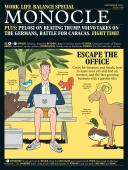
Issue 106
Pelosi on beating Trump, Volvo takes on the Germans and the battle for Caracas. Fight time!
In This Issue
Oops! No content was found.
Looks like we no longer have content for the page you're on. Perhaps try a search?
Return Home
Click here to discover more from Monocle

Pelosi on beating Trump, Volvo takes on the Germans and the battle for Caracas. Fight time!
Looks like we no longer have content for the page you're on. Perhaps try a search?
Return Home